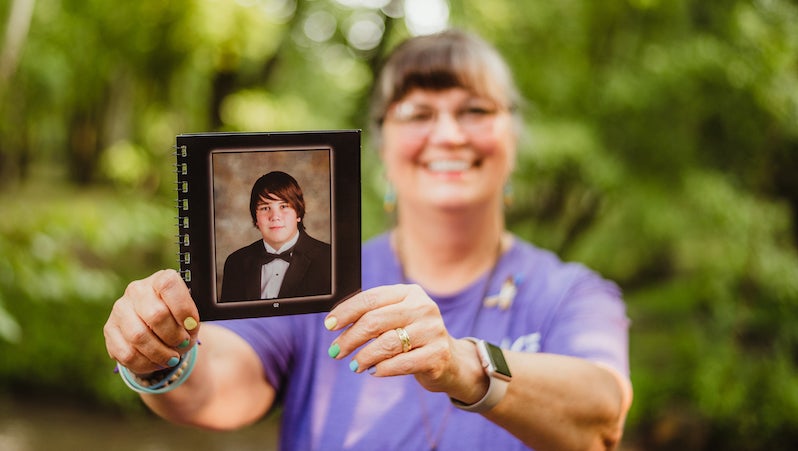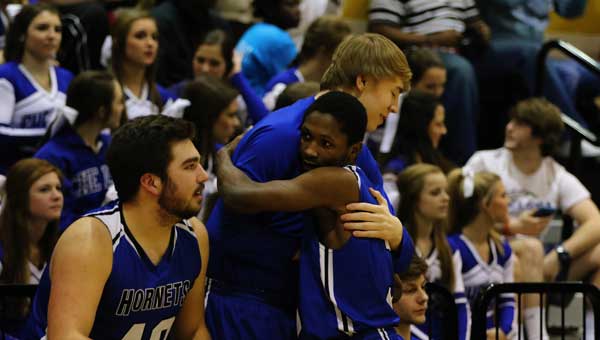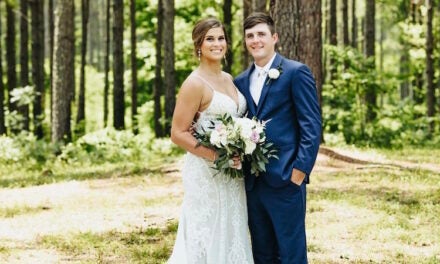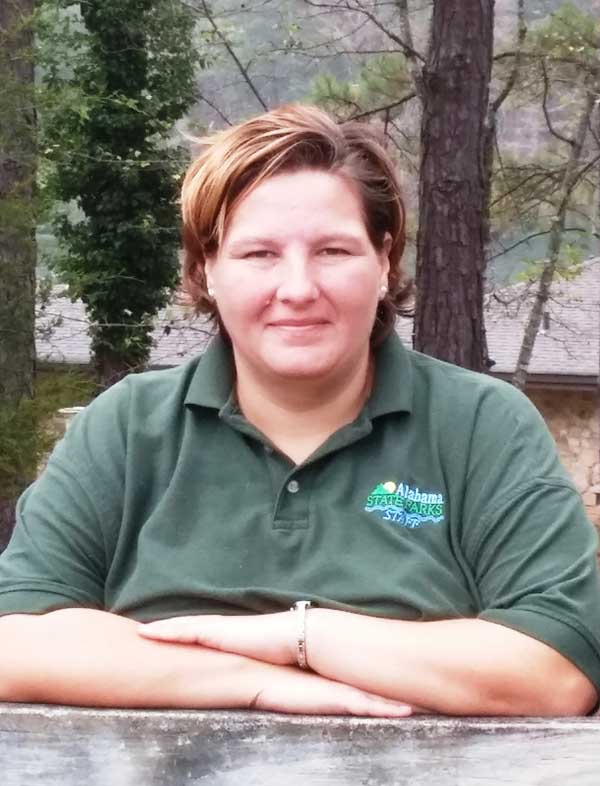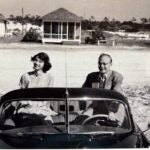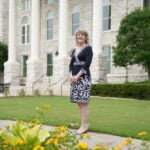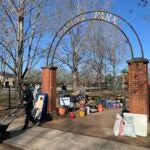“Just tell me it’s not Joshua. Please tell me. Tell me it’s not Joshua…”
“Ms. Coogan, I hate to tell you this over the phone…”
And I knew. I knew what he was about to say when he said those words. I have been on the other side as a nurse breaking the news, and I knew that the next words out of his mouth would be that it was Joshua, and that he was not alive.
I threw the phone down and began screaming. Crying, yelling. Screaming.
On Sept. 9, 2012, Linda Coogan and her husband, Danny, were in New York City as part of a business trip while she was a nurse working with a hospital auditing team. The 9/11 Memorial & Museum had just opened, and Linda sobbed out loud as she looked at the countless photos of lives that had been senselessly taken in the terrorist attacks. A true empath, she was no stranger to tragedy. Her older brother had died of a drug overdose, her uncle had been murdered during the Civil Rights Movement, and she had survived childhood sexual abuse and physical abuse in her first marriage. She was a survivor, a warrior.
But tragedy lay ahead, too.
When Calamity Came
That night when Linda and Danny were in their hotel room getting ready for dinner, she got the phone call no parent ever wants to receive.
Her older son Matthew Smith was saying someone had called him and said three people were killed at their home. She hung up the phone and searched for the number for the Pelham Police Department. “Tell me it wasn’t Joshua,” she pleaded, knowing her younger son had been at their house. And then she got a call back. “Ms. Coogan, I hate to have to tell you this on the phone…” a voice said. “This is all I heard and knew it was Joshua,” she says. “When I found out, I could do nothing but scream out loud. You just can’t imagine. It completely changed my life.”
That night Joshua, 22, had watched the University of Alabama football game on the big screen at his family’s home with friends. He had just started his first job at Charter Cable after attending Shelton State Community College. His future was wide open. But hours later, Josh and his friends Casey Cumberland, 22, and Simeon Gilmore, 19, were shot with a .45-caliber Glock as part of a burglary attempt at the home. Joshua had died from a single gunshot to his head as he lay sleeping on the living room couch.
Now Linda is telling the raw, compelling story of her journey through grief and forgiveness in a new memoir that will be published this fall, The Impact Statement: Reinvesting in Life After Experiencing Your Worst Nightmare. (The opening lines of this article are an excerpt from it.)
After two years of trials and investigations, on Oct. 20, 2014, Jon Ingram Staggs was found guilty of five counts of capital murder. After the verdict, District Attorney Jill Lee, one of the prosecuting attorneys on the case, gathered all three of the victims’ families and told them that the defense attorney said Staggs would give up his right to appeal if he could get life in prison in lieu of the death penalty.
“I stood up and said, ‘Thank you, God,’” Linda says. “I just thought, ‘What a beautiful thing God has done!’ I don’t believe in the death penalty, but I don’t know that I would have fought it. But I think it’s something that would have bothered me.”
In that moment Linda’s family asked if they could share their impact statement. Back in the courtroom, Staggs said his piece, but Linda and the other families never got the chance. In the end, Staggs was sentenced to life in prison without parole.
Moving Forward
When her sons were children, Linda would often place her hand on their chests when they fell asleep at night and feel their hearts beating, their chests and tummies moving ever so slightly up and down.
At Joshua’s wake, she did this one last time. “When I touched his body, I felt that peace that surpasses all understanding,” she says. “I stepped into heaven just for a moment. I tell people that a piece of my DNA went to heaven that day.”
With the help of her husband, she began taking life one minute at a time, from the moment she decided to lift her head off her pillow each morning. Her Christian faith, grief counseling and members of her church family at Riverchase Presbyterian Church also helped carry her through her worst nightmare.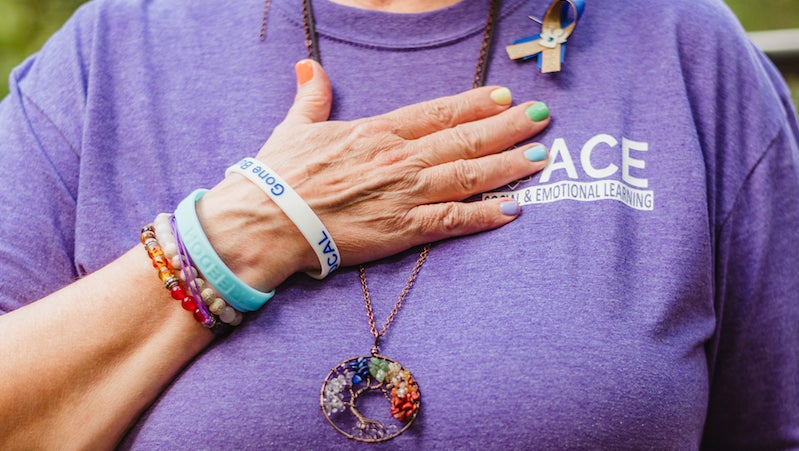
Soon she’d become unstoppable as a survivor and warrior. In 2015, she and her older son, Matthew Smith, started Alaquest Collaborative on Education, a nonprofit organization that teaches non-violent conflict resolution to children in local schools. Now living part-time in Eufaula, she also works as a health and wellness coach and teaches tai chi to senior citizens. She also posts her thoughts and experiences related to grief, forgiveness, prayer and finding peace on her blog, Joshua’s Pearls.
“I remember one young lady talking to me about forgiveness, and I once again began to cry uncontrollably,” she writes on the blog. “It is hard to even type the word forgive. I told someone yesterday that I HATE that word. Now I am asking myself why.” She goes on to quote Matthew 18:21-22: “Then Peter came and said to Him, ‘Lord, how often shall my brother sin against me and I forgive him? Up to seven times?’ Jesus said to him, ‘I do not say to you, up to seven times, but up to 70 times seven.’”
Linda firmly believes that what was meant for evil can be used for good. “The pain of a traumatic loss can seem unbearable and much harder to work through,” she writes. “I am reminded of how an oyster makes a pearl. The irritation of a grain of sand triggers a release of a substance that surrounds the sand eventually turning it into a pearl. Take the pain of your loss and turn it into a beautiful pearl.”
Last year, Linda was asked to take on the role of state survivor lead for Moms Demand Action on Gun Sense, a national grassroots organization that pushes for stronger gun laws and work in our communities and with business leaders to encourage responsible gun ownership.
“I want to be clear that my stance is not about gun violence. It’s about the root cause of gun violence, teaching people to recognize their emotions,” Linda says. “What we’re talking about is not taking away rights. Yes, we have a right to own guns as American citizens. Yes, we have a right to defend ourselves and our families. And yes, with that right comes a huge responsibility. If we’re going to own a gun, if we’re going to use a gun, we need to be able to demonstrate that we can do so responsibly and not cause harm to others.”
Acting on a Promise
In many ways, the past is ever present in Linda’s life. When she watches a local church service online that has a prison ministry, she sometimes wonders if Staggs is watching that same service, sitting in prison. She has a lot of questions for him that she hopes may be answered someday. Is he truly sorry? If he had been part of a program like ACE, would it have prevented what happened?
There’s a part of her that wants to talk to him and validate that what he said in the courtroom was true, recalling his words: “I’ve been called evil and arrogant, but that’s not really who I am. One night, one minute defined my life, defined 20 years. I’m going to do the best I can to make use of this opportunity you’ve given me.”
“I’ve been told, no, you don’t want to (talk to him),” Linda says today, “but I was also told that I wouldn’t want to see the crime scene evidence, or that I wouldn’t want to see Joshua’s body. But I did, and I believe it helped me in the healing process.”
Eight years ago, in her fog of grief and depression, she was advised not to speak to the media. When she was in the courtroom looking at crime scene pictures, she was told if she showed any emotion or reaction, or if she cried, she would have to leave the room.
But she never forgot the promise she made to herself and others. Now she is following through on it: “One day I’m going to speak, and the whole world is going to hear me.”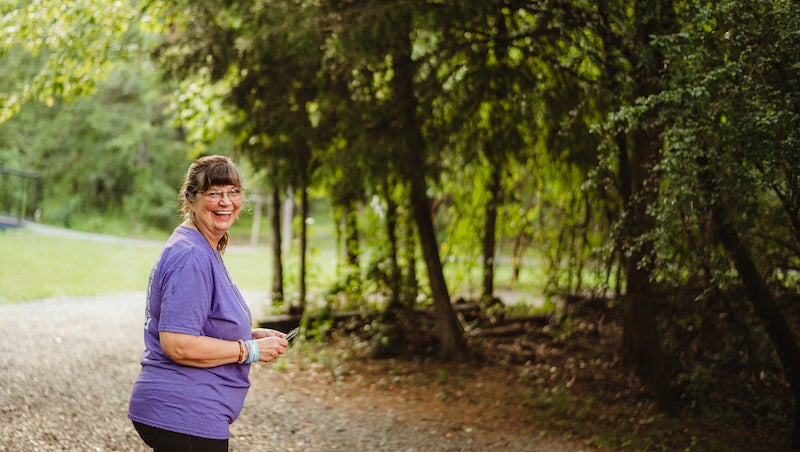
Linda’s Tips for Those Who Are Grieving
- You will not get over the loss, but you can get through the grieving process. If we try to stuff our feelings and pretend we are okay, they don’t get processed and they come up at the most inopportune times.
- No one can tell you how to grieve nor how long it takes. You will probably feel like people think you should be “over” your grief, but we all process grief differently.
- Don’t compare your grief to others’. My mother-in-law took my son’s pictures off the wall. I was angry. It felt like she was trying to erase his memory. When I addressed it with her, she said that it made her cry to see his picture. We both had different grieving processes.
- People can mean well when they say what feels hurtful to you. Most people don’t know what to say, so they pull from the common things they have heard from others. Two that hurt me the most are, “I know how you feel,” and “I’m sorry if I reminded you of your loss.” Really, did you think I forgot? It’s better for others to just be there for you and listen.
- Talk about your loved one and memories of their lives even if it makes others uncomfortable. I have had moments when I was afraid I would forget my son Joshua’s life and how he lived because there was so much focus on how he died. I love hearing others talk about him and talking about him myself almost eight years later. It feels like I’m a proud mother talking about my son.
- Elizabeth Kubler-Ross’ stages of grief are not in a step ladder form. It’s more of a muddy pit with all of the stages on the sides and depression on the bottom in a muddy pit you can fall into any time.
- Forcing yourself to put your feet in the ground and get out of bed is imperative. I know it feels comfortable under a blanket with popcorn, ice cream and a good book or movie, but you’ll feel better later if you get out.
- Numbing the pain with drugs, alcohol, food or inappropriate relationships doesn’t make it go away. It only makes the wounds deeper and hurt twice as much when they come to surface.
The Impact Statement
Written by Joshua’s Brother, Matthew Smith
For 22 years, until Sept. 9, 2012, I had the privilege of having a little brother who was also my best friend. Joshua and I were two years and two days apart. We shared birthday parties, Christmas presents and bedrooms. We shared joys and sorrows. We went through our parents’ divorce and the trials of adolescence. We buried our father 10 months before Joshua was murdered. He had died from a car accident. We did all of this together and supported each other every step of the way.
I thanked God every day for the relationship I had with my little brother. Our friends often commented on how lucky we were to be close with our sibling, and I knew that they were correct. I say again that Joshua was my best friend. He knew more about me than any other person in this world ever could and we would let nothing come between us. He defended me. I comforted him. We were partners in figuring out this complicated world.
On Sept. 9, 2012, I lost my brother. He was taken away from me by way of senseless execution. Now, I continue to thank God for the time that I had with him and yet my days are filled with the pain and sorrow of knowing that there is no one left in this world who truly understands me in the way that he understood me. We will never hold each other again. I will never hold his children in my arms. I will never be the same.
We will never be the same.

